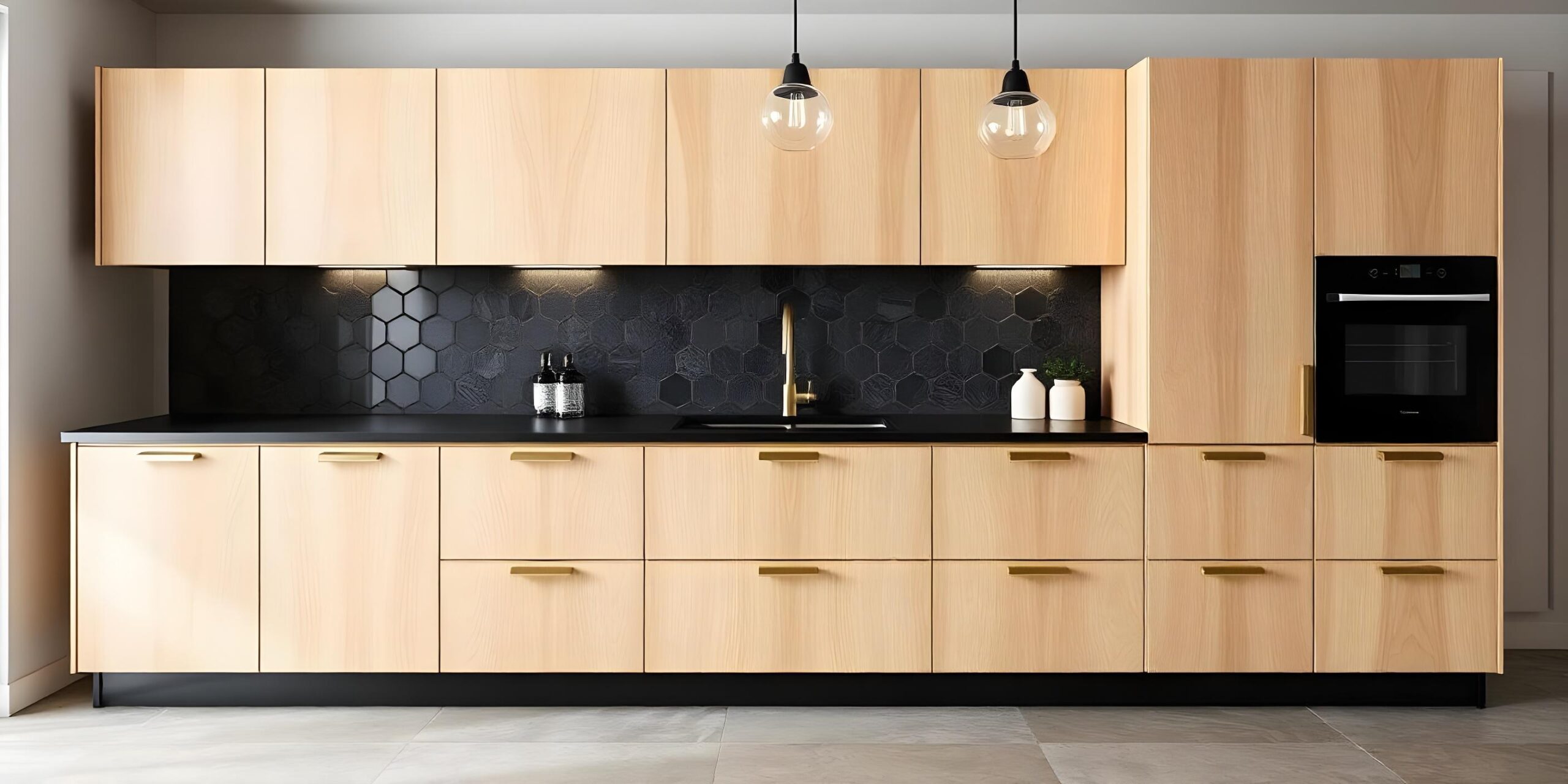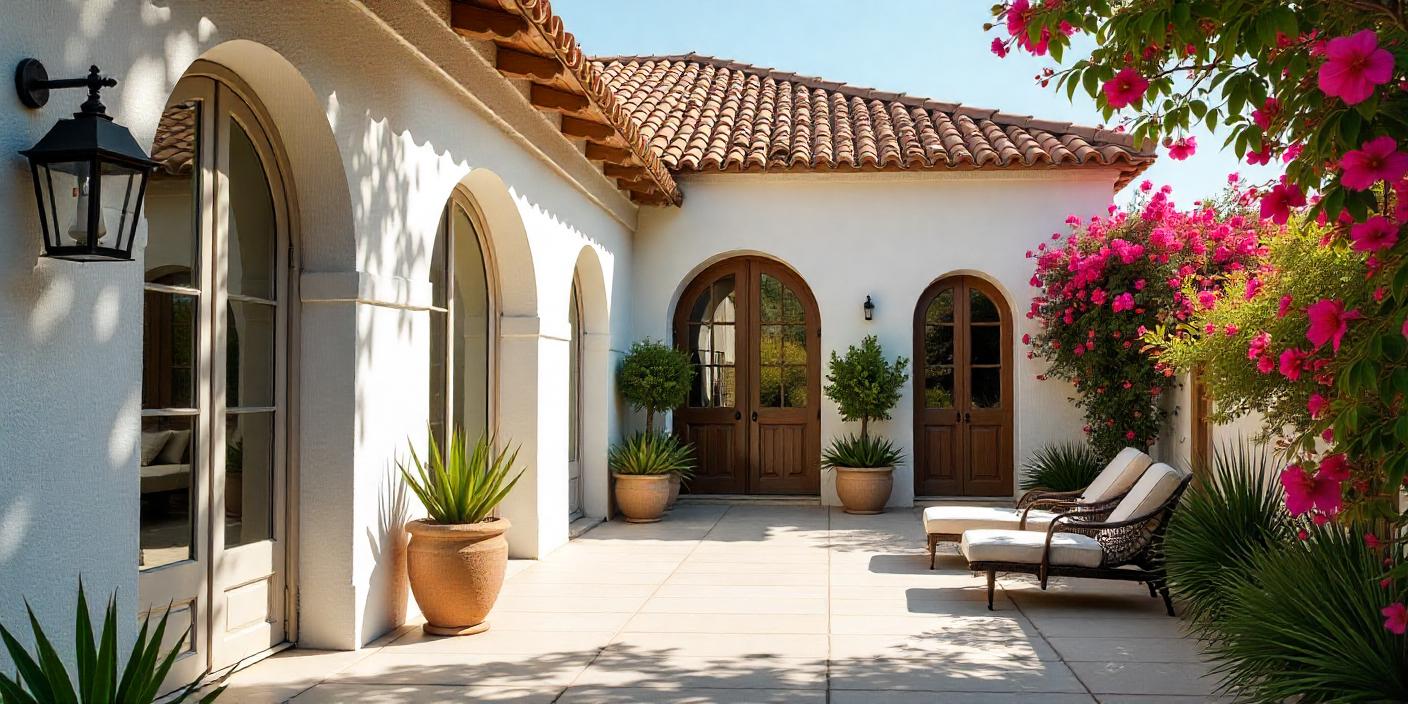Speaking about kitchen remodel or kitchen renovation, wood is always a typical material to be associated with kitchen cabinets.
In today's market, melamine and plywood kitchen cabinets are two of the most popular choices for solid wood products. Before homeowners make a decision on which type of cabinets to choose for their dream kitchen, it is important to compare the differences between melamine and plywood kitchen cabinets.
Plywood vs. Melamine Fabrication: How Construction Methods Impact Durability
Melamine Kitchen Cabinets
Melamine wood is a composite wood made by compressing wood particles together at the core. The compressed wood particle core is then covered with a resin and paper finish to form an outside layer. It is important to note that although melamine is a type of laminate, not all laminates are melamine.
Melamine kitchen cabinets are a popular choice for homeowners and interior designers alike, thanks to their versatility and ease of maintenance. These cabinets are made from melamine, a type of plastic material known for its durability and resistance to scratches, stains, and moisture. The material is available in a wide range of colors, designs, and patterns, making it easy to match any decor style.
One of the biggest advantages of melamine cabinets is their affordability. They are often less expensive than their solid wood counterparts, making them an excellent option for those on a tight budget. Additionally, melamine cabinets are relatively easy to install, and they require minimal maintenance compared to other cabinet materials. (However, this is not very true in Johor context. Solid Plywood tends to be cheaper or similar price here)
Melamine is not just limited to kitchen cabinets; it's also widely used in many other applications, such as bathroom cabinetry, display counters, office furniture, whiteboards, and flooring. In fact, melamine is often preferred over other materials for its versatility, resistance to wear and tear, and cost-effectiveness.
When it comes to cleaning melamine cabinets, you can use a mild detergent and warm water to wipe down the surfaces. Avoid using abrasive cleaners, as they can scratch the material and cause it to lose its luster. With proper care and maintenance, melamine cabinets can last for many years and continue to look great.
Overall, melamine is an excellent choice for cost-effectiveness, low maintenance, and versatility in cabinetry. Its availability in different colors, designs, and patterns ensures that you can find the perfect match for your home decor style.
Plywood Kitchen Cabinet
Plywood is a type of wood that is made by layering thin sheets of wood on top of each other perpendicularly, and then gluing and pressing them together to create a hard board. This process typically involves three to seven layers of veneer strips, resulting in a strong panel that can withstand nailing and splitting.
One of the main benefits of plywood is that it is less prone to splitting when nailed at the edges, making it a popular choice for carpentry and cabinetry projects. Additionally, its ability to resist warping, breaking, and surface damage makes it a top choice for furniture makers. Because of its stability, plywood is also suitable for outdoor use and is commonly used in roofing, flooring, and other structural construction projects.
One of the key advantages of plywood is its construction method. Unlike melamine kitchen cabinets that require a thermal compression process, plywood is made by layering thin sheets of wood, which are then glued and pressed together at a high temperature. This results in a strong and durable material that is less likely to split or warp.
Plywood's resistance to moisture is another reason why it is often used in outdoor projects where exposure to the elements is a concern. Its stability makes it an ideal choice for outdoor use, as it is less likely to absorb and release moisture, which can lead to warping and splitting over time.
It is recommended that you visit the AmpQuartz showroom for custom cabinets.
Here, a wide range of designs and materials can be discovered, showcasing technical skills that are quite rare in Johor. Unique options await those looking for high-quality cabinetry solutions. Your perfect cabinets can be designed to meet your specific needs and preferences.
Installation Face-Off: Why Plywood Outshines Melamine in Practicality
The reason for choosing melamine kitchen cabinets is melamine offers an array of choices and a wide range of selections. Melamine offers many different designs, colours and patterns which you can choose from based on your liking, whereas plywood has very limited designs and they look similar in common.
As far as the constructions and installation in kitchen remodelling are concerned, the tendency of melamine to bend under load is higher than plywood if you are likely to subject it to heavyweights for a prolonged period. The installation of melamine kitchen cabinets must be done with extra caution to prevent damage, especially the hinges and the glides are strong enough to hold.
While both plywood and melamine are durable materials, plywood is lightweight yet strong. Hence, it is a better option for upper cabinets in dry kitchens. Plywood has strong and durable properties, so the cabinets have a very extended and long life. In addition, plywood is more significant when hanging large wall cabinets. It is less likely to run into the risk of collapsing under its own weight. It has a good screw and nail holding capacity which is easier to handle. The surface of the plywood is less smooth than the melamine.
Question: Which is easier to clean: plywood or melamine?
Answer: Melamine is easier to clean than plywood. This is primarily due to its flat and smooth surface. Despite their differences, both materials are versatile and can be used for similar purposes, such as cabinetry, furniture making, and even flooring.
Cost Breakdown: Is Melamine Worth the Savings Over Plywood?

Choosing Kitchen Cabinet Materials: Key Considerations
Budget
Melamine is generally more affordable than plywood due to its thinner composition.
Durability
Melamine is suitable if budget is a primary concern; however, it is less durable than plywood. Plywood is better for projects requiring durability and is ideal for wet kitchens due to its water-resistant properties.
Flexibility and Aesthetics
Melamine is a good option for cost-effectiveness, but painting requires effort to change colors. Plywood offers more flexibility for decorative options and is easier to customize.
Weight
Plywood is lightweight and sturdy, making it a practical choice for most kitchen environments.
Final Decision
Evaluate all factors: cost, durability, functionality, and personal preference before choosing materials.
FREE Cabinet Consultation
AmpQuartz offers free consultation services to help design your dream kitchen.
Reach out for expert kitchen cabinet ideas and guidance.
Nowadays, it is observed that homeowners in Malaysia, especially in Johor, have their own ideas regarding cabinet designs.
The role of cabinet makers like AmpQuartz is to equip themselves with a variety of materials and designs while continuously improving technical skills to align with the cabinet styles desired by homeowners.
At the same time, efforts are being made to make custom cabinets more affordable by strengthening the supply chain and collaborating with financial institutions to offer financing options.







